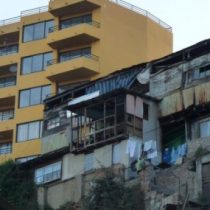
One of the main achievements that many economists enthusiastically highlight relates to Gini’s fall in inequality rates over the past few decades. Beyond the theoretical and practical imperfections of the indicator, this is an irrefutable fact: As shown in the attached chart, the Gini fell almost 10 points between 1990 and 2015, at an average rate of 0.45% per annum, from a level of 0.58 to 0.47.
This certainly represents a breakthrough, however, we consider that a more precise look at what happened becomes necessary. Three elements to consider:
First. The current Gini index is the same as that recorded in the late 1960s, that is, we regained this level after 60 years of history (Rodríguez Weber, 2014).
Second. According to the study of Atria et al. (2018) and world inequality database data (WID,2020), the 1% richest share of national income share fell from 1990 to 2003 (at an average rate of 0.29% per annum), but then again risen (at a rate of 0.17% per annum) reaching 2015 at a value similar to that of 1990 , that is, about 24%, the highest participation among the more than 40 countries in which it has been measured. (see Chart)
Third. The share of labour (wages) in the economy (Villanueva, 2017), corresponded to 30% in 1990, growing until 1998 at an average annual rate of 0.44%. Subsequently, a drop of 0.48% per year is seen in 2015, reaching a value of 31%, almost identical to the beginning of the period in question. (see Chart).
In this way we see that the improvement in the Gini indicator during the revised period (1990-2015) coexists with the zero change in both the richest 1% income and the share of wages in the economy. The above inevitably leads to the question Who are more equal then?
From the data analyzed, we maintain that the only thing that may be generating this decrease of the GINI indicator is the redistribution of revenue from the half and middle tiers affluent to the poorest.
True, we are more equal in terms of income than in the return to democracy, but the richest 1% does not enter this equation, this group still holds the same 24% of income, our “record” – regrettable – both in the OECD and in Latin America.
Tax policies pursued during democracy, while they have reduced poverty and income inequality (the latter to 1960 levels) between middle and low groups, have not touched the wealthiest groups in society or allowed an increase in labour income share.
The low tax burden on the rich and super-rich, coupled with the fact that 60% of the total tax benefits are concentrated in the richest 1% of the population, corresponding to 2.4% of GDP (Jorrat, 2005), hardly help to counteract the unbearable weight of unequality, substantially hampering our journey towards prosperous and inclusive development.
Source. Lopez and Sturla based on Atria et al. (2018), WID (2020) and Villanueva (2017).
The content poured into this opinion column is the sole responsibility of its author, and does not necessarily reflect the editorial line or position of El Mostrador.
"El reclamo puede ser genuino, pero construido sobre una mentira", apuntó el presidente Javier Milei…
El gobernador de la provincia de Buenos Aires, Axel Kicillof, encabezó un acto en Ensenada…
El diputado nacional de La Libertad Avanza, José Luis Espert, expresó su confianza en la…
Tras la masiva reaparición de Cristina Fernández de Kirchner, el presidente Javier Milei apuntó contra…
El principal propósito de la nueva comisión es evaluar los recursos humanos en el Senado,…
En una medida que busca redefinir las condiciones de los seguros de automóviles en Argentina,…
Esta web usa cookies.